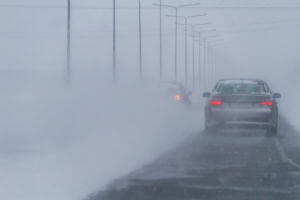 Winter weather whiteouts cause dangerous driving conditions. If you are caught driving in severe winter weather, it is important to keep calm and act safely.
Winter weather whiteouts cause dangerous driving conditions. If you are caught driving in severe winter weather, it is important to keep calm and act safely.
Greg Monforton and Partners’ seasoned car accident lawyers in Windsor discuss safety tips for driving in whiteout conditions below. If you have been injured in a winter weather car accident, schedule a free, no obligation consultation with our team and learn your legal options for recovering compensation.
Whiteout Driving Dos
Whiteout conditions involve blowing snow that can completely block your view of the road. If blowing snow is in the forecast, stay home and wait for conditions to clear. Drive only if necessary, and use extreme caution.
If you find yourself on the road in these conditions, the Ontario Ministry of Transportation recommends you use these tips for driving in whiteout conditions:
- Pack your vehicle with emergency supplies such as blankets, non-perishable food, water, flashlights, snow shovel and other essential goods. Include a long rope that is kept in your front or back seat. If you are stranded in poor visibility conditions, tie one end of the rope to your steering wheel and the other to your wrist. This will allow you to access your truck or other areas of the car without losing track of your vehicle.
- Turn the vehicle lighting system completely on to improve visibility, and use low-beam lights. High-beams reflect off ice and snow, making it more difficult for you to see the road. If you have fog lights, use them.
- Travel at a speed safe for the conditions. Do not speed, and go slower than the posted speed limit if necessary. Reduce your speed gradually if you find you are going too fast.
- Limit maneuvers such as passing or changing lanes. Keep additional space between other vehicles to allow more time for braking if needed.
- Focus all your attention on driving. Cut out all distractions in your vehicle.
- Look far ahead of you as you drive so you can detect potential hazards early.
- Keep your hands on the correct nine and three o’clock positions on the wheel for best control.
- Keep your windows and windshield clear by using a defroster and the air conditioner if needed. Being able to see it vital to being able to see what is happening around you.
- If you have no visibility due to weather conditions, get off the road if possible. Find a safe place to park and wait out the storm.
Whiteout Driving Don’ts
When driving in whiteout conditions, there are also several things you should avoid doing:
- Do not stop on the road in a traffic lane where vehicles travel. Other motorists do not expect a vehicle to be parked or stopped on the road and could crash into you if they are not able to see you.
- Avoid jerking the steering wheel to make corrections, which could cause you to slide off the road.
- Do not drive over your vision limit. If you can only see 20 metres ahead, your speed should allow you to stop in 20 metres, but keep in mind that braking distances on snow and ice are about 10 times longer than on good road conditions.
- Do not pass slow-moving vehicles or increase your speed to get away from a vehicle that is tailgating you.
- Do not leave your vehicle if you are stranded in severe weather. Stay warm in the car, cracking a window for ventilation. Turn on your flashers and only turn on the vehicle as needed while you wait for help. If you must get out of the car, do not stand near the road where others are traveling.
Contact Our Car Accident Lawyers for Help
If you were injured in a wintertime car accident, you may be entitled to compensation for your medical bills, lost wages, and pain and suffering.
At Greg Monforton and Partners, our experienced car accident lawyers will investigate your claim to determine if you have cause for legal action against the at fault driver. We will help you pursue the compensation you deserve.
Schedule a free, no obligation consultation now. We work on contingency and only take payment if we successfully recover compensation for you.
Call (866) 320-4770 or complete our Free Case Evaluation form now.

